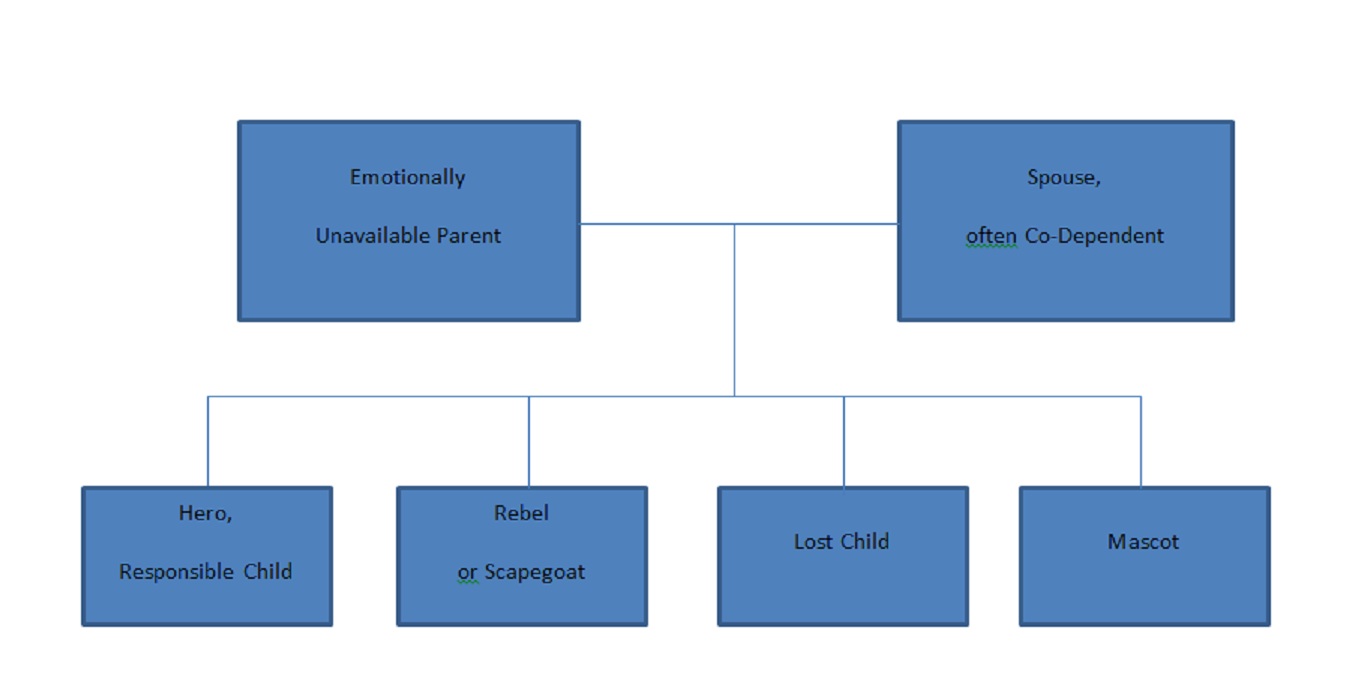Many decades ago, counselors saw an interesting outcome from treatment of alcoholics (most of whom were male): their clients seemed to do better when the spouse attended a week of treatment geared specifically for them. Proven repeatedly, the conclusion was clear: when the spouse of the alcoholic worked on herself, he recovered more quickly and more strongly.
For a number of years, this model was followed to a variety of results. But therapists started noticing another trend. A large number of their clients were adult children of alcoholics. And over a decade of work, many therapists (particularly Claudia Black, Sharon Weigscheider-Cruse, and Charles Whitfield among others) realized there was a consistent pattern to the outcomes of the children raised in an alcoholic home.
Eventually therapists concluded that the adult children of any emotionally absent parent, where the spouse/other parent focused their attention on that partner resulted in these same outcomes. So a family with a mentally ill mother, work addicted father, sex addicted parent, etc. etc. all resulted in children learning to cope in similar patterns.
Research was clear: no role is exclusive. So every child has some of every role in them, but usually one role predominates in each child. This is the children’s learned method to manage the stress of their familial environment. The roles do not rely on birth order.
Every role is present in every family:
- In two child families they adopt two roles to cope.
- If the family has 3 siblings, one child will double up their coping roles.
- If there are more than four children, more than one child will have a role, but these coping strategies are usually determined in some context of birth order, because the first four children will learn and adapt and the fifth child will pick up and repeat a role.
- In a family with multiple births, particularly triplets, which tend to be a unit unto themselves, the roles will be complete in their birth unit. The rest of the children will have another set of the same roles. For example, a client of mine was one of 6 children, including triplets. The non-triplets adopted roles as expected and so did the triplets! So one child from each ‘group’ of siblings doubled up on a role.
- Only children are almost always Heroes, or the Responsible Child.
Over the next few weeks, we’ll examine each of these roles in detail. Please don’t try to psychoanalyze your family. No simple blog can give you enough information to do that, but I hope to provide enough information for you to gain some insight into family dynamics and family roles.
Here’s a simple chart to show you the roles. Again, don’t confuse placement of these roles with birth order. It’s a simple mechanism to put a difficult topic on paper.


This is going to be great for my WIP. It has the abusive parent with emotionally struggling children, thanks. I can’t wait to read more.
Lynda
I’d start with this post and work forward from there – or pick and choose. hope you enjoy.
An interesting post and look forward to the what follows. As a wife of a recovering alcoholic as well as a mother of recovering drug addict, this hits very close to home. I have two other children at home as well and it is interesting to see which role they fall into.
thanks for stopping by. your family situation was the template for this work, although it is now known that many families fall into this group for many reasons, which I sum up as the emotionally barren family. feel free to ask questions – happy to help
Another vital, informative post, Louise. You’re an angel for sharing your wisdom and insight!
thanks for stopping by August. Glad you are learning something
Okay, I’m really trying to not put my family in this scenario. Very illuminating and I’m looking forward to where this journey takes me. Thanks for all your fab posts, Louise. They are helping in ways I never expected (all good ways!).
glad these are helpful Tameri. Don’t put your family in here – at least wait until all four roles are documented and explained a bit
Oh my Louise. This sounds like it’s more common than we’d like to think. But how interesting what research has found in linking certain behaviors within the family. Deep subject Louise. One that only you can decipher. You’re the pro with this stuff. But I can’t wait to read more about this because I think there’s a little of this in just about every family. Which if you think about it, is kinda scary. Yet it’s good that we can be educated on the subject. Thank you Louise for sharing your knowledge. 🙂
I find it fascinating (Bet that doesn’t surprise you, Karen). We’ll see how it goes. I have to find a way to keep these shorter, but that’s a plan for another day. stay well.
Oh boy, family dynamics. I’m really looking forward to this topic, Louise. I love reading about family dynamics! 🙂
hang on for lots of info, then Sheila. works great for character development as well.
Interesting… and good that you pointed out that it doesn’t necessarily correlate to birth order, because that immediately occurred to me.
Even though you’re posting this in the context of real life, these are good things to know for developing characters for our fiction as well.
Yes, I have written about these roles for RWA newsletters – they work very well for fiction. Smart lady to pick up on that.
Very interesting stuff, Louise. Thank you for sharing.
thx for stopping by Debra. this is the introduction to the idea.